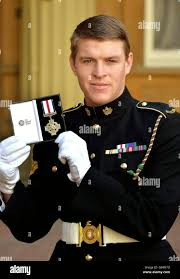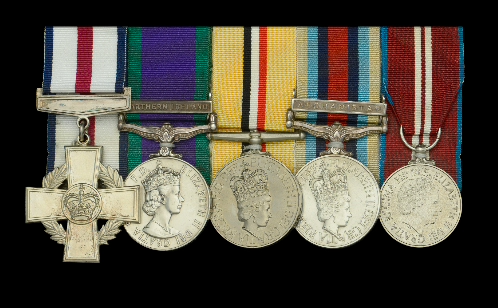b. 1989 Birkenhead, Cheshire.
DATE OF CGC ACTION: 25/03/2013 Camp Folad, Afghanistan.
Josh Edward Hayden Griffiths from Eastham, Wirral, Merseyside joined the British Army in September 2006. Having served previously in Afghanistan as well as Iraq and Northern Ireland, Griffiths was deployed with C Company (Cheshire), 1st Battalion, Mercian Regiment to Afghanistan as part of Herrick 17 on 6 October 2012.
On 25 March 2013 at ISAF Patrol Camp Folad, Nad-e Ali, Helmand, Afghanistan, Corporal Griffiths was 23 days from the end of his tour and preparing to eat his evening meal when a pick-up truck packed with half a tonne of explosives was driven by a suicide bomber through the wall of the base. The resulting explosion tore a 40m gap in the perimeter wall; it was the start of an attack that was to last for several hours:
‘I was thrown around as well as everyone else and the next thing I remember it was dark and I was on my back. I heard one of the lads scream out.’
The cookhouse was utterly destroyed by the blast, as was the operations room. Griffiths’ back had been broken by the blast and grenade fragments were embedded in his face, just millimetres from his left eye. He was one of fifteen casualties (of whom one later died):
‘My first instinct was to see who was hurt and help. One of the lads was shouting that another was badly injured. We had to crawl through the debris in the dark to get him out… I heard one of the lads scream out, so I approached him and helped and then I climbed out of the tent to see if there were more casualties. When I did that, there were rounds snapping past and I thought, “That’s a bit close.”’
Still disorientated, dressed in a combat shirt and fatigues without protective equipment, he grabbed a light machine gun and leaving the collapsed cookhouse, he was immediately confronted with a group of insurgents inside the walls of the base launching grenades and assaulting his position with automatic weapons less than 50m from him and the other casualties:
‘The job just took over and I pushed forward… I think adrenalin kicked in. Around me there were a lot of casualties. As soon as I was out in the open air, bullets where whizzing past my head, missing me by millimetres… I turned left and there were the insurgents standing there… they were also firing rocket propelled grenades. All I could think was ‘I have to stop them or they’ll kill me and my mates… I knew my friends were in trouble so I thought I’ve got to go out there and take the fight to them before anything happens to my lads.’
For some time an intense fire fight ensued at a range of just 25m. Despite his debilitating injuries, Griffiths killed one insurgent and his immediate response halted the insurgents at the northern wall of the base, allowing his injured comrades to be extracted:
‘I thought I’ve got to stay there… rather than me getting killed or my mates getting killed I wanted to kill them first.’
Inspired by Griffiths’ instinctive courage and leadership, other uninjured British soldiers began to arrive and join the fray, launching grenades back at the insurgents. Griffiths then, having consulted with the Sergeant-Major, decided that the best way to protect the base was to lead an attack on the enemy. With utter disregard for his own safety, he and the Sergeant-Major then led a small team as they charged forward and defeated the insurgents. Only once the base was secure did Griffiths agree to step back and receive medical treatment for his wounds.
It was only afterwards that he realised he not only had damaged his eye, but had also broken the fourth vertebrae in his back in the original explosion when the vehicle hit the base. He later reflected:
‘When I got taken back to Camp Bastion and was lying in a hospital bed I thought about what happened – replaying what happened in my head… I was devastated we had lost a soldier. It is an amazing honour to receive the award and I am very proud but I’d much rather it hadn’t happened and he was still with us.’
Griffiths was later evacuated back to the UK due to the seriousness of his injuries. Whilst making a full recovery from his physical injuries, Corporal Griffiths went on to suffer from Complex Post Traumatic Stress Disorder as a result of the barracks attack, and numerous other deeply disturbing incidents during his tours of Afghanistan. He was awarded the CGC for his actions, and in his letter of congratulations from the then Prince Charles it stated “I was particularly pleased and proud to hear the splendid news of your thoroughly well-deserved Conspicuous Gallantry Cross and very much wanted to drop you a line to send you my most heartfelt congratulations. To say that I am full of admiration for your truly exceptional courage, initiative and endurance, not to mention your selfless commitment to protect your comrades, is a serious understatement.”
Josh left the Army and now works in Close Protection. He is also a Patron of the Trauma Research UK charity. On 23 February 2022, he sold his CGC medal group at Noonans in Mayfair for a hammer price of £130,000.
CGC CITATION:
On the evening of 25 March 13, with no warning, a massive Vehicle Borne Improvised Explosive Device (VBIED), tore through the outer wall of the joint Afghan National Army (ANA) and International Security and Assistance Force (ISAF) base. Estimated to be made up of half a tonne of explosives, the VBIED left a 40m gap in the perimeter wall, exposing the base to a well organised and complex attack. The cookhouse, where Corporal Griffiths and his fellow soldiers had been eating their evening meal was destroyed as was the operations room, which had been hit by 2 Rocket Propelled Grenades (RPGs); resulting in casualties. Realising that a small number of determined insurgents had already gained entry into the patrol base and were less than 50m away from him and the other casualties, despite being seriously injured and wearing no protective equipment, Griffiths rallied the dazed soldiers around him. Armed with a light machine gun that he had grabbed in the chaos, Griffiths faced down the enemy who were throwing grenades and firing automatic weapons, placing himself and one other soldier between the casualties and the insurgents. His immediate actions halted the insurgents at the northern wall of the base, allowing the casualties from the initial explosion to be extracted. As other uninjured soldiers began to arrive, Griffiths who could have stepped back to receive treatment for his injuries, shrugged off his injuries and aided by the Sergeant Major, led a small team of soldiers as they charged forward in order to secure the base. Griffiths’ actions certainly saved the lives of his wounded comrades and contributed significantly to the successful defence of the base.
LOCATION OF MEDAL: PRIVATELY HELD.


